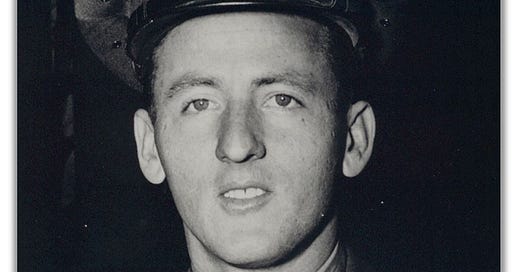Medal of Honor Monday: Jefferson DeBlanc
He didn’t have enough gas to get home if he finished the mission. He went anyway.
At about this time in 1921, a hero is born. Jefferson DeBlanc was just a young boy when he discovered a love for aviation. An airplane had made an emergency landing in a pasture close to his home in Louisiana, and the stranded pilot let Jefferson climb into the cockpit of his plane.
Naturally, DeBlanc was hooked. Of course, no one could know what was coming: DeBlanc would not only learn to fly, but he would also go on to become a hero in the skies of the Pacific!
Then-First Lt. DeBlanc’s heroism came on January 31, 1943, as he led a group of fighter planes on a mission near Kolombangara in the Solomon Islands. Eight fighters from Marine Fighting Squadron 112 were to escort dive bombers and torpedo planes towards their Japanese targets.
The journey was technically too long for DeBlanc’s Wildcat. An extra fuel tank had been attached to the fighter’s wing, but DeBlanc soon saw that it wasn’t working. He was using gas too quickly, and he wondered if there was a leak.
“Two guys must have had the same trouble because they turned back and went back,” he later described. “So that left six of us to do the job of protecting the dive bombers.”
He knew he didn’t have enough gas to get home if he finished the mission, but it just didn’t matter.
“We needed all the guns we could get up there to escort those dive bombers,” he said. “I figured if I run out of gas, I run out of gas. I figured I could survive a bailout. You’ve got to live with your conscience. And my conscience told me to go ahead.”
The American planes soon reached the Japanese target, and they were instantly engaged in combat. But the dive planes had another problem: Float planes were attacking them at low altitudes. DeBlanc turned to help. “I burned two of them immediately, and the rest of them left,” he said simply.
At this point, his mission was technically over. The dive bombers had accomplished their runs and were returning home. DeBlanc was running out of fuel, and he could have left—but he didn’t. Some Japanese Zeroes had arrived in his vicinity.
“They did not see me at first, so I got the first crack at them and burned the first guy, the leader, shot him down,” DeBlanc recounted. “And that’s when everybody broke up into dogfighting. I shot down a total of five airplanes, plus one probable.”
DeBlanc’s Medal citation describes a “valiant battle against terrific odds, seizing the tactical advantage and striking repeatedly,” but DeBlanc wouldn’t make it out of the dogfight unscathed.
“That’s when I got hit,” he explained. “The first bullet came through over my left shoulder and took my watch off my wrist, and a 20 mm followed and hit the instrument panel.”
He bailed out, quickly pulling his rip cord. “Floating through the air,” he smiled, “it was beautiful. . . . Man, that was the most sensational thing I ever did in my life.”
When DeBlanc hit the water, he was still 8 miles from shore. Hours later, he finally pulled himself onto dry land, but he was soon found by natives. Fortunately, rescue came the next day.
“This guy came in and threw down a 10-pound sack of rice, which he stole from the Japanese,” DeBlanc recalled. “He threw it down at their feet, and they picked it up and let me go. From then on, I felt safe.”
He’d been traded to someone who was sympathetic with the Allies. Before too long, DeBlanc was safely aboard a U.S. Navy patrol plane, returning to safety.
DeBlanc didn’t think he’d done anything special. “I took the Medal [of Honor] for the guys who went down, with whom I fought and who didn’t come back,” he concluded. “We got it together.”
Sources can always be found on my website, here.





Jefferson DeBlanc, another MOH recipient who felt that he did nothing special, just did his job.
Mr. DeBlanc bravely and calmly shot down 5 or 6 enemy planes on a mission where he knew that he couldn't make it back without bailing out. I call him a Hero. Thank you Tara.
Such courage! What might have happened had he not pushed forward, protecting the bombers? Mission accomplished--and then some! Thanks, Tara, for such a story.